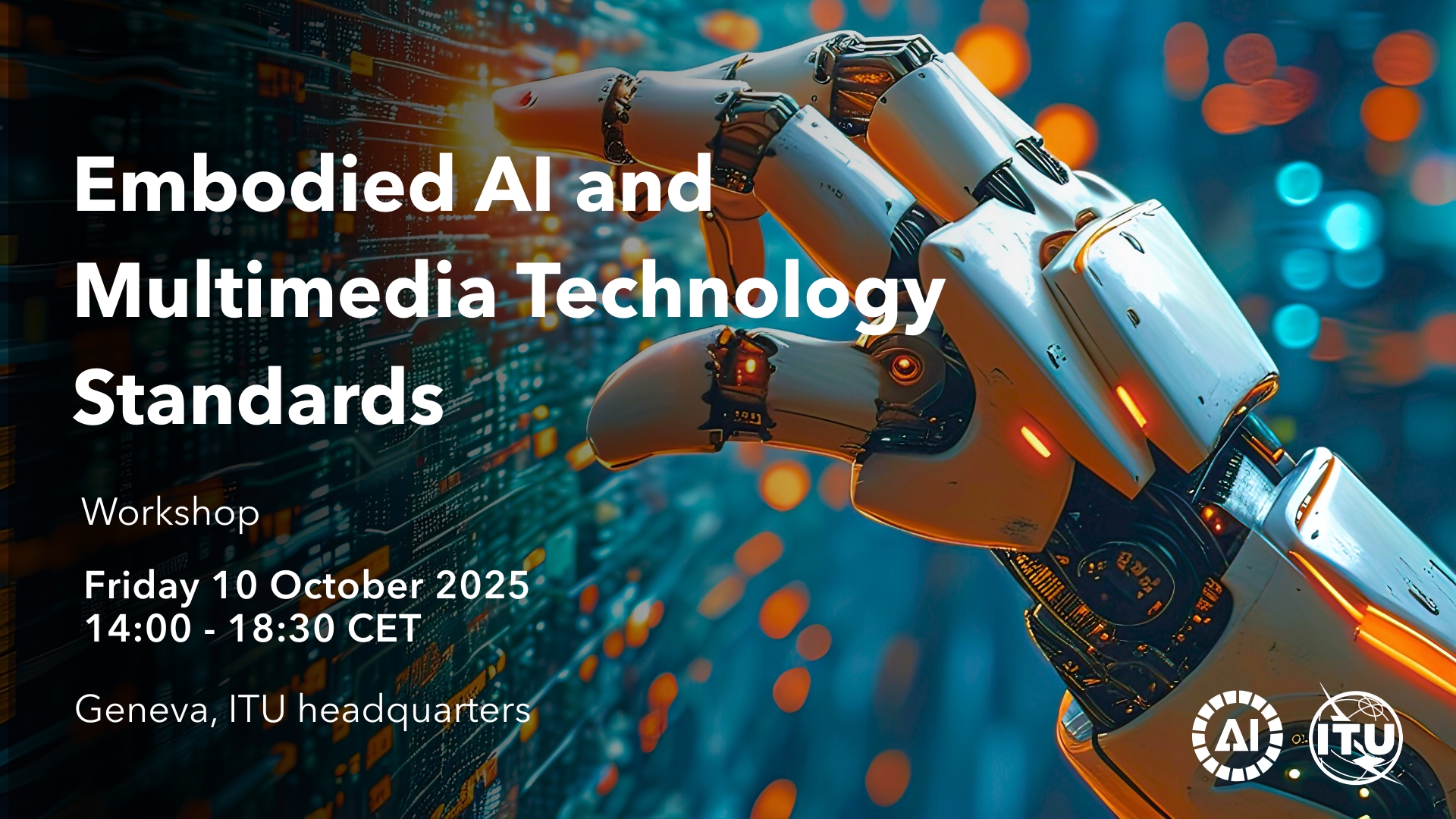
The International Telecommunication Union (ITU) was organizing a workshop on
“Embodied AI and Multimedia Technology Standards”, taking place at the ITU headquarters in Geneva, Switzerland, on
10 October 2025 from 14h00 to 18h30 hours (CEST). The workshop was co-located with the meeting of the
ITU-T Study Group 21
"Technologies for multimedia, content delivery and cable television" (Geneva, 6-17 October 2025).
Remote participation was provided for the workshop.
Embodied AI (EAI) can be described as a transformative shift in artificial intelligence that integrates AI into physical systems, enabling them to interact with and learn from their environment through sensory inputs and actions.
The aim of the workshop was to bring together institutions, academia, and industry to discuss the requirements for enabling embodied AI in multimedia. Key topics included exploring standardization opportunities for technology advancement, identifying gaps in ITU-T Recommendations, examining real-world use cases for embodied AI in multimedia, and fostering collaboration across the ICT supply chain, with a focus on defining future work for ITU-T SG21 related to embodied AI technologies. This event was a continuation of the success of the valuable discussions from the AI for Good Global Summit (July 2025).
A demo showcasing cutting-edge multimedia applications powered by AI technologies was organized at the venue.
Participation was open to ITU Member States, Sector Members, Associates, ITU Academia and to any individual from a country which is a member of the ITU and who wishes to contribute to the work. This also includes individuals who are members of international, regional, and national organizations. Participation in the workshop was free of charge, however registration was mandatory.
Watch recording of the session here
Remote Participation: Connect to the
ITU MyMeetings platform using the
same ITU user account with which you
registered for the meeting. You can launch the remote session by clicking the
JOIN button from 30 minutes prior to the start of the meeting.
Programme
14:00 - 14:15
|
Opening Remarks
|
|
14:15 - 16:15 |
Session 1: Embodied AI – Exploring the intersection with multimedia services and emerging use cases
This session will explore the convergence of Embodied AI and multimedia technologies, focusing on how multimodal data is driving transformative innovation in healthcare, smart manufacturing, and other industries. Presentations will showcase key ICT applications and demonstrate how the integration of both fields is transforming industries, enabling intelligent, data-driven solutions.
Moderator: Yuntao Wang, Q5/21 Rapporteur I CAICT, China
-
Kai Wei, WP2/21 Vice-Chairman and Q12/21 Rapporteur of ITU I Secretary-General, MIIT TC1 :“What is Embodied Artificial Intelligence and Why it matters to ITU” [Presentation]
-
Imad Elhajj, Professor, Department of Electrical and Computer Engineering, AUB, Lebanon: “Embodied AI Embedded with Humans” [Presentation]
-
Kashif Ikram, Vice President for Europe, MicroPort Scientific: "Robotic Tele-surgery: The Next Frontier in Surgery" [Presentation]
-
Julya Rebstock, Information Governance Practice Manager, Symantec Enterprise Division, Broadcom, USA [Remote] &
John Caras, SG17 Field CTO for Telebiometrics, USA [Remote]: “Security and privacy aspects of Embodied AI and robotics” [Presentation]
-
Zhongxia Zhao, Research Fellow, Beijing Academy of Artificial Intelligence (BAAI) & Visiting Scholar, Peking University BAAI, China: “Observations on the Robotics Field and Multimodal Sensors” [Presentation]
-
David Robert, Director of HRI, Boston Dynamics
"Designing Industrial Applications of Embodied AI" [Remote] [Presentation]
|
16:15 - 16:45
| Coffee Break Kindly sponsored by AIIA
(There will be an Embodied AI demo during the coffee break)
|
|
16:45 -17:30 |
Session 2: Embodied AI – Redefining Multimedia Content and Applications
Embodied AI requirements for real-time multimodal fusion (vision, audio, and tactile inputs) will introduce new challenges in delivering multimedia content. Experts from academia and industry will share their perspectives on next-generation multimedia content, interface definitions, spatio-temporal synchronization, and other areas for future standardization.
Moderator:
Justin Ridge, Vice-Chair SG21 & WP3/21 co-chair, Nokia Corporation, USA
-
Touradj Ebrahimi, Professor, EPFL & Founder, RayShaper SA & Chair, JPEG: “Towards efficient vision representation and coding standards for superior embodied intelligence” [Presentation]
-
Guoping Pan, Co-founder & VP of Algorithms, Zerith Robotics, China: “How to Transform Data into Knowledge” [Presentation]
-
Andrea Cavallaro, Full Professor, EPFL, Switzerland: “Multimedia content for embodied AI” [Presentation]
|
17:30 - 18:15
|
Session 3: Embodied AI – The Future of Collaborative Multimedia Connectivity
Embodied AI essentially relies on powerful multimedia communications (high data rates, low latency, as well as advanced transmission capabilities). Future directions to be explored include developing collaborative communication mechanisms to provide optimal delivery and consumption of Embodied AI-enabled services.
Moderator:
Lukasz Litwic, Vice-Chair SG21 I Senior Research Manager, Visual Technology, Ericsson, Sweden
-
Hang Liu, International SparkLink Alliance, China: “Integrating Embodied AI with Short-Range Communication: Challenges and Standardization Opportunities” [Presentation]
-
Jorge Peña Queralta, Senior Lecturer and Research Group Leader, Centre for Artificial Intelligence (CAI), Zurich University of Applied Sciences (ZHAW), Switzerland : “Agentic Embodied AI: Distributed Applications from Edge to Cloud” [Presentation]
-
Abhishek Gupta, Founder and CEO, Open Droids Robotics, USA: “Building an Open-Source embodied intelligence Future” [Remote] [Presentation]
|
|
18:15 - 18:30 |
Closing Remarks
-
Noah Luo,
Chair, SG21 I Huawei Technologies Co., Ltd., China
|
